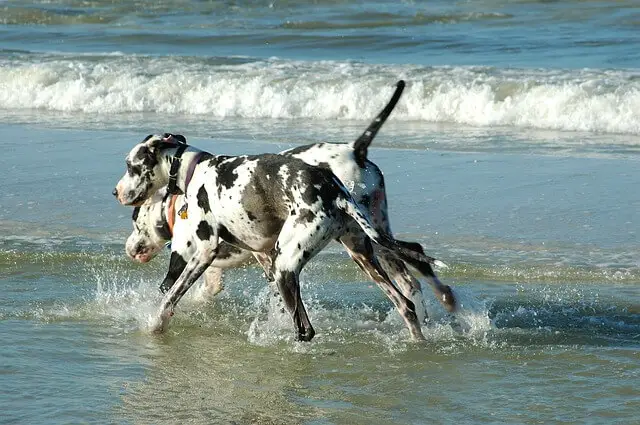Why Do Large Dogs Live Shorter Than Small Dogs?
23.01.2022.
The animal kingdom is a wonderful place with many amazing creatures living in it. Animals come in all shapes and sizes. The general rule in the animal kingdom is the larger you are, the longer you live. For example, an elephant or a blue whale live a lot longer than a tiny mouse. Sure, small animals can become prey to hunters. However, even if they lived in perfect conditions with no animals threatening them, they would still live significantly shorter than the huge animals we mentioned.
The dog kingdom is different. The longevity rules are backward, and the smaller you are, the longer you live. Chihuahuas have an average lifespan of 14 - 16 years, while Great Danes live 6 - 8 years on average. Why is that so? Why don’t large breeds live longer than small breeds? Here’s what you should know about why small dogs live longer than large dogs.
Why is size important in dogs?
There are many reasons why size matters in the dog kingdom. For this topic’s purpose, we will focus on how size plays a role in a breed’s average lifespan. Two major studies were dedicated to finding out why large dogs live shorter than small dogs. One study was conducted by an evolutionary biologist at the University of Göttingen in Germany, Cornelia Krauss. The other study was done by Dr. Silvan Urfer from the University of Washington.

These two studies combined analyzed data of more than 222.000 dogs. Mixed-breed dogs and pureblooded dogs were included in both studies, as well as dogs of all sizes. Krauss’ research concluded that large breeds develop faster than small breeds. They have accelerated development and aging, making them more susceptible to terminal diseases like cancer. Cancer is basically abnormal cell growth, which is more likely to happen when a dog experiences rapid cell growth, like the one we can see in large breeds like the Great Pyrenees, St. Bernards, or Great Danes. They are also more susceptible to age-related health issues, like osteoarthritis.
Dr. Urfer’s study was focused on proving that small dogs actually live longer than large dogs. They weren’t focused on finding out why; they just wanted to make sure this statement was true and learn the average lifespans of certain breeds. His study included 169.000 dogs that died or were euthanized across the US in three years. After careful calculations, the researchers found out that;
- Small dogs live 14.95 years on average
- Medium-sized dogs live 13.86 years on average
- Large dogs live 13.38 years on average.
The interesting thing they learned is that a dog’s breed plays little to no part in its longevity. That means an individual dog’s size is more important than its breed for its average lifespan. When you think about it, it makes complete sense. Large dogs will develop faster, regardless of their breed.

What affects a dog’s lifespan?
Different things can affect an individual dog’s lifespan. The dog’s living conditions, diet, physical activity, dental health, and breeding will play a part. Those are just some of the things that will play a role. Here’s how;
Physical activity
Just like in humans, physical activity will affect the dog’s overall health. That means dogs that exercise will live longer and healthier than those that don’t. Regular exercise will strengthen the dog’s muscles, help their cardiovascular system remain as healthy as possible, and keep the dog’s weight at recommended levels.
Diet
A high-quality diet will play a role in the dog’s lifespan. The basic principle is the same as in humans. If we eat organic, healthy foods, we will be healthier than if we eat junk food filled with questionable ingredients. Make sure you get your dog on high-quality dog food, and you will ensure they are as healthy as they can be.

Dental health
Dental health is just one of the “health” parts dog owners should look out for. However, this is an aspect that is often overlooked. It is crucial because tartar and bacteria buildup in your dog’s mouth and teeth can lead to serious health issues, which will shorten the dog’s lifespan.
Weight
According to recent studies, like the one conducted in WALTHAM Centre for Pet Nutrition and the University of Liverpool, a dog’s weight will impact its lifespan. Unfortunately, about 55% of American pets are overweight or obese. Despite the claims different body positivity movements made, obesity is not healthy. Overweight pets are more prone to breathing issues, joint issues, and certain types of cancer.
Breeding
There are many genetic diseases dogs can inherit from their parents. However, the larger the gene pool, the lower the risk of contracting these diseases. That means that pureblooded dogs need to be carefully bred. Responsible breeders should study dogs’ pedigrees and ensure they don’t produce inbred puppies. Inbreeding increases the risk of genetic problems, health, and a dog’s lifespan.

In conclusion
Different things will affect how long an individual dog lives. Dogs are different from the rest of the animal kingdom because their larger members live shorter than their smaller members. The situation is exactly the opposite in the wild. According to recent studies, small dogs live longer than large dogs, but the exact cause is still somewhat unknown. Things like the development speed play a role, but we still need to learn many things to know conclusively why small dogs live longer than large dogs.
World Dog Finder team







Share